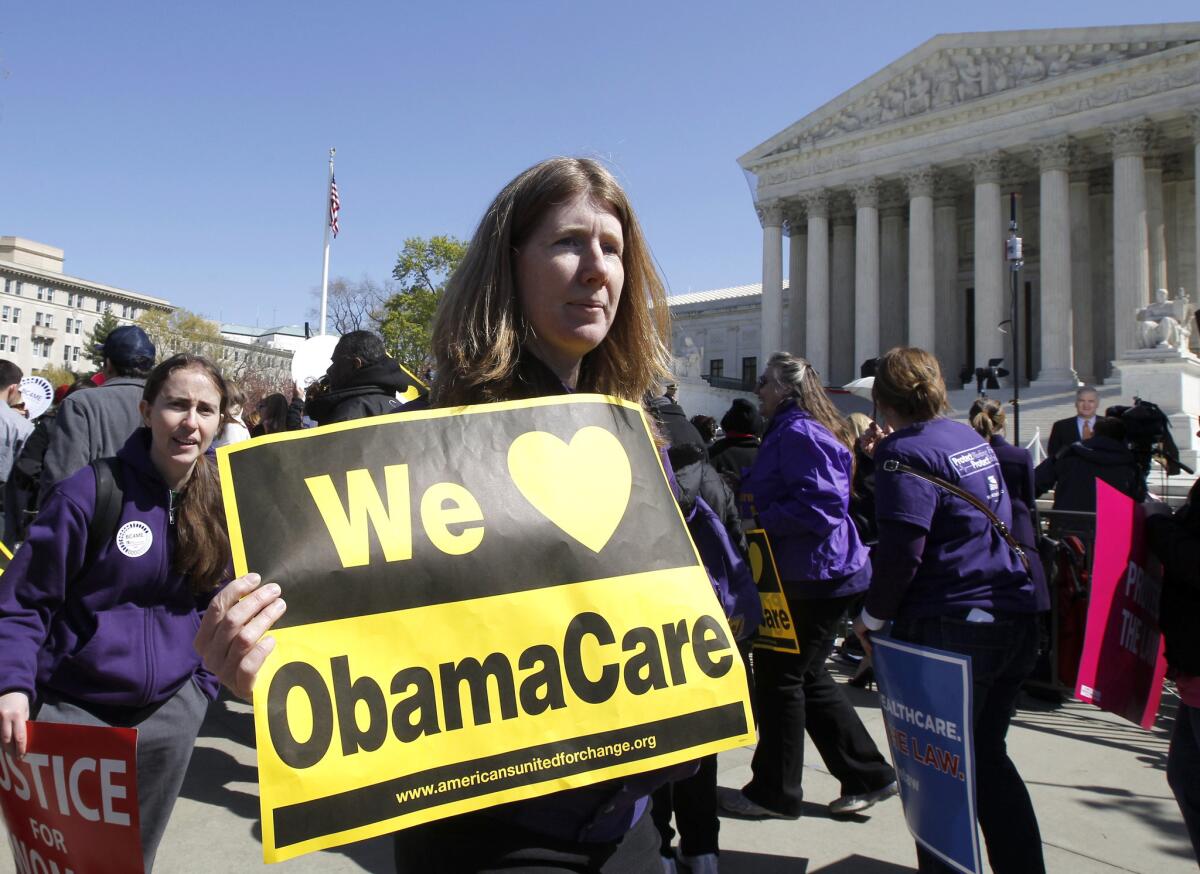Column: The Supreme Court Obamacare case centers on technicalities, but much more is at stake

- Share via
Anyone listening in to the nearly two hours of oral arguments before the Supreme Court over the fate of the Affordable Care Act on Tuesday might have thought that the important issues were abstruse principles of legal standing and statutory severability.
Those may indeed be the principles on which the court will decide whether to declare the entire ACA unconstitutional — as Texas and the other red states bringing the case are asking. But they don’t touch on what’s at stake.
The task of reminding the court of the real-life ramifications of the case fell to lawyers for California and other blue states defending the law, and the Democratic-controlled House of Representatives.
The plaintiffs’ argument “would cause enormous regulatory disruption, upend the market, cast 20 million Americans off health insurance during a pandemic and cost the states tens of billions of dollars during a fiscal crisis,” warned California Solicitor Gen. Michael Mongan, speaking for the states. “There’s no basis for that result in text, intent or precedent.”
There is just no way that Congress would have preferred an outcome that...ends protection for people with preexisting conditions and creates chaos in the healthcare sector...this is not a game.
— Former Solicitor General Donald Verrilli, at the Supreme Court
Former U.S. Solicitor Gen. Donald Verrilli, representing the House, underscored his point.
“There is just no way that Congress would have preferred an outcome that throws 23 million people off their insurance, ends protection for people with preexisting conditions and creates chaos in the healthcare sector,” he said. Texas’ “arguments take constitutional adjudication as a game of ‘gotcha’ to a whole new level, but this is not a game.”
As broadly as Mongan and Verrilli painted the consequences of invalidating the ACA, they actually minimized the powers of destruction in the court’s hands. That’s because the Affordable Care Act affects more than merely the market for individual health insurance.
The law’s provisions extend to Medicare and Medicaid, to drug industry regulation, to home care for elderly and disabled people and to the finances of hospitals large and small. The law affects healthcare not of 20 million or 23 million Americans, but at least 130 million with preexisting medical conditions and even more dependent on the law’s consumer protection provisions.
More on that in a moment. But first let’s examine the absurd basis of the Texas lawsuit and the hints about the outcome of the case that one can divine from the justices’ questions.
Biden doesn’t need a Democratic Senate to save American healthcare reform.
Several experts in Supreme Court Kremlinology concluded after listening to Tuesday’s session that there may be a majority on the court willing to declare the ACA’s individual mandate unconstitutional, but also a majority in favor of leaving the rest of the law in place. A decision is expected sometime early next year.
The Texas lawsuit hinges on the 2017 tax cut law passed by a Republican Congress and signed by President Trump. The law took a swipe at the ACA by reducing its individual mandate penalty — the tax charge imposed on Americans who fail to carry heath insurance — to zero from a few hundred dollars per person.
The plaintiffs argue that because the court upheld the ACA in a 2012 decision that interpreted the individual mandate penalty as a tax within Congress’ authority. That kept the law on the right side of constitutionality, according to the decision.
Once the penalty was zeroed out, it no longer functioned as a tax, the plaintiffs contend. Therefore the basis for the 2012 decision no longer exists.
The second prong of the plaintiffs’ argument is that the whole law must stand or fall in its entirety. In other words, the court can’t merely invalidate the individual mandate, but must toss out the entire ACA. That’s the “severability” argument — or more properly, the “inseverability” argument.
Many legal scholars consider these arguments preposterous in the extreme, but they’ve been accepted by a Texas federal judge and a panel of the U.S. 5th Circuit Court of Appeals. That’s how the hot potato ended up in the Supreme Court’s lap.
It’s worth noting that the incoming Joe Biden administration could have made this whole mess go away by enacting a one-line amendment to the ACA either reimposing the mandate penalty or specifying the severability of the ACA’s other provisions.
But that would require congressional assent. With the Senate apparently remaining in the hands of Republicans, whose hostility to the law is manifest, that’s not likely to happen before the court rules.
A new poll shows that the Affordable Care Act is more popular now than ever. Here’s why.
One feature that makes the plaintiffs’ arguments dangerous to pursue is that the 2012 decision was written by Chief Justice John G. Roberts Jr., who is therefore in a good position to know how far he meant his judgment to go. His comments during Tuesday’s session suggested he’s unconvinced that he meant to place the entire law on a knife edge.
“It’s hard for you to argue that Congress intended the entire act to fall [if] the mandate is struck down, when the same Congress in lowering the penalty to zero did not try to repeal the rest of the act,” Roberts told Texas Solicitor Gen. Kyle D. Hawkins, representing the plaintiffs. “I think they wanted the court to do that, but that’s not our job.”
Justice Brett M. Kavanaugh also stood up for the idea that if Congress wanted the whole ACA to die with the penalty, it would have said so. “Congress knows how to write an inseverability clause, and that’s not the language they chose” in the 2017 tax cut law.
Roberts seemed to show exasperation with the persistence of the ACA’s foes in ginning up progressively more frivolous challenges to the 10-year-old law. The Texas case is the seventh appeal for the justices to overturn the ACA wholly or in part.
As Roberts complained to acting U.S. Solicitor Gen. Jeffrey B. Wall, representing the government (that is, the Trump administration, which supports the Texas case), by trying to expand their challenge to the individual mandate into a wholesale attack on the law, the plaintiffs were vastly expanding the concept of standing.
That’s the principle enshrined in the Constitution that parties can bring to federal courts only genuine harms or issues pertaining to themselves.
Expanding the standing rule in an era when many federal laws have scores or even hundreds of provisions, Roberts indicated, would place the whole U.S. code at risk.
A federal appeals court is both too activist and too feeble with Obamacare ruling
“Just in this act alone you’re talking about almost a thousand pages, and you’re letting somebody ... sort of roam around through those thousand pages and pick out whichever ones he wants to attack,” Roberts said.
That brings us back to the breadth of the ACA. The act comprises much more than the establishment of the individual health insurance marketplaces and the consumer protections in health insurance generally.
The act made far-reaching changes to Medicare reimbursement policies that have been “baked in” to a system that pays out some $800 billion a year to doctors, hospitals and other healthcare providers, as Christen Linke Young of the USC-Brookings Schaeffer Initiative for Health Policy observes.
“Reverting Medicare’s payment rules to a pre-ACA state,” Young wrote, “would require revisiting dozens or even hundreds of policy choices [Medicare] has made since 2010, which would likely take months or years.” Working out all those implications could paralyze the payment system, leaving providers unpaid indefinitely.
Overturning the ACA would reopen the notorious Medicare “donut hole,” an artifact of Medicare Part D through which enrollee reimbursements are reduced after they’ve reached a certain level, then raised again after they cross another higher threshold. The donut hole was closed by the ACA.
The invalidation would end Medicaid expansion, which is 90% financed by the federal government. That would create billions of dollars of unexpected expenses for states and could throw millions of Americans off Medicaid.
An adverse decision would upend regulation of biosimilars — drugs that are similar but not exact copies of existing brand-name pharmaceuticals, but which were legalized, within limits, by the ACA.
“New approvals would immediately cease, and the status of the 28 biosimilars currently approved would be uncertain,” Young observes. “Manufacturers of the approved products would not know if it was legal to continue making their products, pharmacies would not know if they could legally dispense them, and patients would not know if they would continue to have access to them.”
The ACA, in other words, was a measure with hundreds of moving parts, some of which interacted with each other and some of which remade parts of the American healthcare system in ways that cannot be undone without immense difficulty, or at all.
That should provide perspective on the act of vandalism that is the Texas lawsuit. It should never have gotten this far, and certainly should go no further. The court must toss it out and thus signal that what Verrilli called a “game of ‘gotcha’” ends here and now.
More to Read
Inside the business of entertainment
The Wide Shot brings you news, analysis and insights on everything from streaming wars to production — and what it all means for the future.
You may occasionally receive promotional content from the Los Angeles Times.













